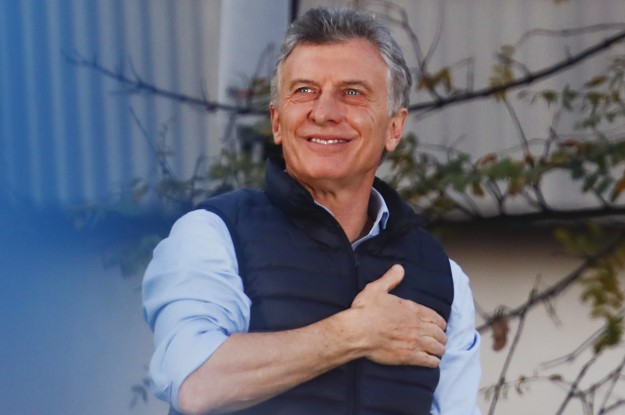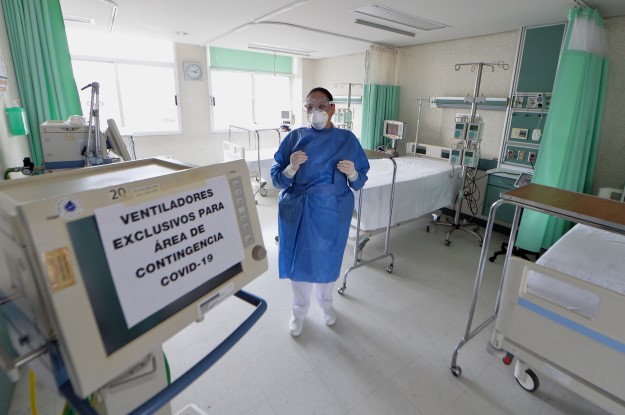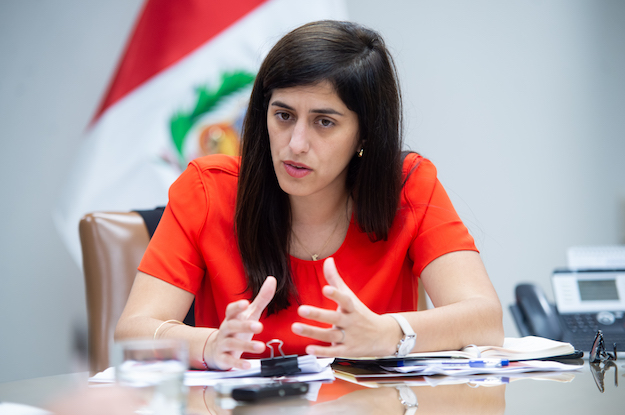Click here to read more about Argentina’s presidential race.
“Macri is absolutely inspiring,” a visibly excited João Doria, then mayor of São Paulo, beamed during a visit to Buenos Aires in September 2017. A month later, Mauricio Macri’s coalition went on to win a resounding victory in congressional elections, winning the capital and 13 out of 23 provinces. This seemingly confirmed that moderate, center-right leaders of a certain stripe were ascendant not just in Argentina, but in much of Latin America.
Doria, who is now governor of São Paulo state and a contender for Brazil’s presidency in 2022, was not the only Latin American politician who modeled their political strategy on Argentina’s leader in recent years. In 2017, Brazil’s then-president Michel Temer argued that Macri “served as an example“, lauding his economic reforms. During a visit in July to Caracas, several Venezuelan opposition politicians told me that a Juan Guaidó government would follow the Macri playbook. Guaidó himself went so far to tell Argentine voters it was their “moral duty” to reelect him.
That incipient movement is now in search of a new role model following Macri’s stunning defeat in the August primaries, which most believe presages a first-round loss in the real elections on October 27. If confirmed, Macri’s fall from grace will reverberate across Latin America – and raise questions about whether there is indeed space for a moderate, democratic center-right in an era of increasing polarization.
Macri’s surprise victory in 2015 was seen, by many economic liberals, as the beginning of a new era. At the time, Macri’s cabinet line-up of well-regarded technocrats impressed international observers and Wall Street — “technocrats to the rescue”, The Economist swooned. Macri’s triumph was interpreted by many as the beginning of the end of the ‘pink tide’ of center-left (and far-left) governments that swept across Latin America during the first decade of the 21st century, boosted by high commodity prices. Even before taking office, Macri became a regional agenda-setter when he criticized human rights abuses in Venezuela, initiating a process that would eventually lead to Maduro’s near-complete diplomatic isolation in South America.
Indeed, what began with Macri’s victory in Argentina and Maduro’s loss in parliamentary elections in Venezuela in December 2015 continued with the Bolivian voters’ remarkable rejection of President Morales’ project to eliminate term limits (a result he ultimately ignored) and Dilma Rousseff’s impeachment in 2016, ending 13 years of left-wing rule in Brazil. The victory of Pedro Pablo Kuczynski, a former IMF economist, in Peru’s presidential elections in June 2016, the victory of conservative Sebastián Piñera in Chile, center-right Iván Duque in Colombia and Lenin Moreno’s decision to abandon his predecessors’ interventionist economic policies only strengthened the overall narrative that moderate, technocratic center-right governments were sweeping the region. At a conference in Buenos Aires I visited with other scholars from think tanks from around the world in 2017, Marcos Peña, Macri’s eloquent and dapper chief-of-staff, was greeted with standing ovations as he outlined the government’s strategy.
The day after Macri’s electoral collapse, I asked a Venezuelan interlocutor about what it meant for Guaidó and the other opposition politicians in Caracas. “We no longer look to Macri, now we look to Macron,” he replied, half-jokingly. Yet given that France’s president operates in a very different political context shaped by topics like Brexit and the future of Europe, only some elements of the French president’s strategy may be exportable. Macron is unlikely to be a useful model for many Latin American politicians who had been inspired by Macri.
Neither is Brazil’s far-right president Jair Bolsonaro, from whom the likes of Doria actively seek to distance themselves (even though the Governor of São Paulo opportunistically embraced the pro-Bolsonaro wave during the 2018 elections). Indeed, Bolsonaro’s illiberal and nationalist brand of right-wing politics is increasingly seen as a threat to the moderate, liberal center-right once represented by Fernando Henrique Cardoso, as Brazilian political scientist Sérgio Fausto recently argued. The very same dynamic is visible in both the United States and the United Kingdom, where Donald Trump and Boris Johnson are seeking to transform their respective parties, from economically liberal center-right parties into more radical nationalist outfits.
Argentina’s upcoming election leaves the region with two regionally visible moderate center-right leaders. Yet while Chile’s Sebastián Piñera has sought to set the regional agenda — in some instances successfully so, i.e. by projecting Chile as the country best prepared to adapt to the rise of Asia — his leadership has not created anything comparable to the pizzazz of Macri’s early years in power. Perhaps that is because the transition from Bachelet to Piñera in Chile was almost boring compared to the dramatic 2015 election in Buenos Aires, and also because of Argentina’s greater global visibility — not least as the host of last year’s G20 summit and as the recipient of the largest IMF loan in history. In the same way, Colombia’s Iván Duque has not inspired as many copycats in the region as his outgoing Argentina counterpart. Paraguay and Ecuador are too small for their presidents to act as trend setters in the region, and Peru’s relative success has been overshadowed by the current political crisis there.
Macri’s exit will thus leave a void for Latin America’s liberal and ‘civilized right’, and its impact is already being felt outside of Argentina. In Bolivia, Macri’s likely departure is thought to strengthen Evo Morales in the campaign against center-right moderate Carlos Mesa, and even Maduro has cited the result as evidence for ‘failed neoliberal policies’. In Uruguay, which elects a new president later this month, the center-right candidate Lacalle Pou sought to distance himself from Macri. It may also increase the risk of economically liberal candidates joining illiberal nationalist forces, as happened in Brazil.
With the center-left likely returning to the Casa Rosada, the resignation of Kuczynski in Peru in 2018, Morales’ likely reelection in Bolivia, Guaidó nowhere near Palacio Miraflores, and a far-right leader in charge in Brasília, the moderate center-right wave which many expected to sweep the region looks far weaker today.







